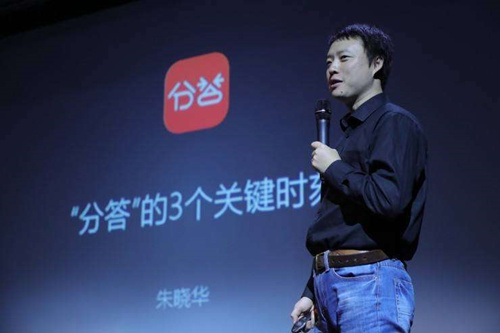
. > WHAT'S NEW > RESEARCH
Pay-for-knowledge platforms contain enormous potential
Author : ZHAO LU Source : Chinese Social Sciences Today 2017-11-07

Launched in 2016, Fenda is one of the most notable pay-for-knowledge platforms. Users can find answers in a timely and interactive manner by paying a sum of money on the app. The platform collected 10 million registrations within a month.
Online pay-for-knowledge platforms have recently proliferated in China, drawing attention from scholars and the public. In an era of abundant information, they offer a shortcut to finding relevant content.
Knowledge categorization
Knowledge spread through the mobile internet tends to be free, but it is fragmented and difficult to categorize. More and more people want to get quality content. Paying for knowledge offers a more efficient way to locate relevant information for mobile internet users.
Huang Chuxin, director of the Media Development Research Center of the Institute of Journalism and Communication at the Chinese Academy of Social Sciences, said in an era of information overload caused by massive amounts of knowledge on the internet, pay-for-knowledge platforms can meet the needs of users in a timely manner. These platforms end up providing shortcuts in terms of time and attention.
Li Mingde, dean of the School of Journalism and New Media at Xi’an Jiaotong University, argued that pay-for-knowledge platforms provide a new model of economic growth. They bring intelligence and skills to the internet as tradeable commodities, and move beyond the previous links among people and materials. In other words, they turn information flow, deployment and upgrades into an intelligence network.
Zhou Kai, a professor from the School of Journalism and Communication at Nanjing University, said online pay-for-knowledge platforms could lead users to respect knowledge, and transform them from aimless, passive receivers of knowledge to active knowledge seekers. Zhou said that paying for knowledge will be closely related to knowledge categorization. High-quality content will be further encouraged, narrowing the gap with “knowledge leaders” and providing users with efficient access to targeted knowledge channels. In addition, pay-for-knowledge platforms are flexible and varied, which will help them expand beyond the current small user bases into non-traditional knowledge markets and enrich types of knowledge.
In this era of changing patterns of consumption, basic subsistence types of consumption are no longer as relevant to people’s needs. Mass consumption tends to be development-oriented. Liu Chang, a professor from the School of Arts at Nankai University, said that pay-for-knowledge platforms represent an elite form of consumption after social wealth been distributed on a large scale. They represent people’s pursuit of contentment and cultural value.
Uneven development
In recent years, the number of pay-for-knowledge platforms has increased dramatically. There are concerns about the sustainability of their payment models in these early stages, despite the obvious benefits of their products.
Li said that on the whole, paid knowledge is mostly user-generated. This means they obtain their resources from users and redistribute or sell them to other users in need. But this model has led to uneven quality of content. In addition, as a profit model, paying for knowledge is supported by the market. It may excessively cater to market demands, which could make it overly entertainment oriented or sentimental.
Huang said that as an important source of information in the internet era, content production has become a core business of online innovation platforms. Online pay-for-knowledge platforms have developed rapidly, conforming to the development needs of the times. But it should also be noted that the current copyright protection frameworks for content production still need improvement. The spread of pirated content greatly reduces the enjoyment of paid users. In addition, the diversification of resources leads to an increase in alternative products, and content producers are faced with the challenge of maintaining a sustainable content payment chain, Huang said.
Zhou argued that pay-for-knowledge platforms require development in two aspects. On the one hand, users assemble fragmented information to solve current problems encountered through the pay-for-knowledge platform. But in the long run, this may lead to fragmentation of information dissemination, preventing in-depth complementation. On the other hand, knowledge related to entertainment takes up a big proportion, meaning frivolous knowledge occupies the largest share.
Ye Shengtao made Chinese fairy tales from a wilderness
Ye Shengtao (1894–1988) created the first collection of fairy tales in the history of Chinese children’s literature...
-
How northern ethnicities integrated into Chinese nation
2023-09-18
-
Mogao caves
2023-09-12
-
Mogao Grottoes as ‘a place of pilgrimage’
2023-09-12
-
Time-honored architectural traditions in China
2023-08-29
-
Disentangling the civilizational evolution of China
2023-08-28
-
AI ethics in science fiction
2023-08-23













 2011-2013 by www.cssn.cn. All Rights Reserved
2011-2013 by www.cssn.cn. All Rights Reserved